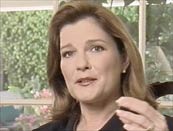Describe the balance of male and female roles during the course of the series. How did that develop?
 Well, it developed in a very unusual way. First of all you had me, right? Unprecedented. Very bold and extraordinary move for Paramount to make, a topical one too, a timely one. I�m very proud of them that they did that.
Well, it developed in a very unusual way. First of all you had me, right? Unprecedented. Very bold and extraordinary move for Paramount to make, a topical one too, a timely one. I�m very proud of them that they did that.
We had Roxanne Dawson in place as Chief of Engineering, and then the rest were male.
Then they introduced Jeri Ryan at the end of the fourth season, who was of course a very compelling, er, figure - shall I put it that way - for any number of reasons, foremost among them and most obviously her great sex appeal, which unsettled me.
I had hoped to punch through by virtue of my own merits and Roxanne�s and those of humanity and dignity and honour and blah-blah-blah. But Hollywood is Hollywood, and as it turned out they drew a wonderful character in Seven of Nine, and Jeri Ryan executed her as no-one else could.
So that was controversial, certainly in the beginning. We had to say goodbye to Jennifer Lien, which was a very uncomfortable situation for myself and I think everybody else. Very tight-knit group, my ensemble, and that factor was upsetting to everybody.
I would say in the end it became a women�s show. I�m sorry to say that in retrospect it became a bit unbalanced. It was Janeway, Seven - Seven, Janeway, and the men were, I think, subjected to supplementing those stories. And that was difficult.
It�s not refreshing where there is confusion or any kind of discomfort in a group that has to work that closely together.
The fact that some of the guys suffered from the feeling of misuse, or under-use, for lack of a better word, did not lend itself to a great sense of ebullience on the set. However, it in no way, disturbed what was a very compatible and happy group.
